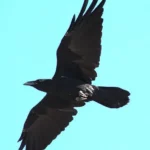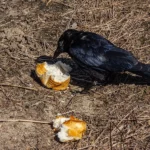Birds sleep by lying on the branches of trees. However, many birds sleep while standing up. Let us learn more about them.
Crows sleep while standing up. Like other birds, crows belong to the order Passeriformes that contain flexor tendons. Flexor tendons allows crows to sleep longer than horses, giraffe and elephant in a standing position.
When a crows lands on a perch, two flexor tendons that typically reach down the rear of its legs to its toes tighten. It is an automatic reflex. The tendons relax as the bird stretches its legs, but they contract when it is still, giving the bird enough stiffness to allow it to doze off while standing.
Are crows awake at night?
Crows are not awake at night. But they sleep in such a position, that they are cautious to the predator strike. They sleep in an upright position so that they are aware of their surrounding and can immediately respond. We can say that crows are partially slept and partially awaken at night.
Scientifically, Rapid eye movement (REM) sleep and non-REM sleep are the two basic types of sleep that birds and mammals both experience. The difference between these two states and wakefulness can be determined by the brain activity.
Where does a crow sleep?
Crows sleep in trees like other birds. But they usually prefer to sleep over large trees with sprawling branches. If the flocks of crows residing in the cities, they find the abandoned buildings to roost.
Apart from trees, they can also roosts in places like high towers, buildings and unused exhaust pipes where they are protected from predators.
Do crows stay in the same area?
Crows are intellectual birds and prefer to stay together. Let us discover whether they prefer to stay in the same area.
Crows stay in the same area for longer period if they aren’t disturbed by the predators or other factors. For nesting, crows usually leave their nest when juveniles become mature and can completely fly by their own.
However, they return to their same nest year after year. They also visit the the same area day by day when they’re about to constructing their nest but they never stay in the same nest for long.
What do you call a baby crow?
Chicks are the name typically used for baby crows. When they first hatch from the eggs, they are referred to as hatchlings. They are called nestlings while they remain within the nest, and finally called fledglings when they leave the nest. Yearlings used to describe baby crows who are roughly a year old.
Do crows migrate like other birds?
Not all crow species migrate like other birds, but some do. Crows can be considered as partial migrants. And that migration is only done for the survival against bitterly cold days. Crows will migrate to countries with warmer climate and come back after the winter.
Crows from the Southern region are ideally recognized to be year-round dwellers. A few adjustments will be made by the group, such as moving to a new location while establishing routes, but a complete relocation is less common.
Why newborn crows are never seen?
New born crows are rarely seen because of two main reasons which are as follows.
- Crows make their nests discrete and well-hidden, and they frequently set them up rather high in the tree canopy.
- Crow nestlings develop so quickly; by the time they fledge, they have reached about 80% of their adult weight.
When you see baby crow, they’ll probably appear less like chicks and more like young adults. If a baby crow is visible, it will probably be on the ground and usually hidden by foliage. Crow chicks are known to wander the area around the nest for one or two days.
How do crow eggs appear?
Crow eggs differ out from other birds egg because of a few distinctive qualities. Let us learn more about this.
The color of crow eggs are olive or blue-green, sometimes light brown and grey with dark brown dots that are dispersed unevenly around the shell makes them fairly recognizable.
Crow eggs typically measure around 1.15 inches wide and 1.6 inches tall. The average weight of their eggs is around 17 grams.
How crows are benefited from communal roosting?
There are various benefits that crows get from communal roosting. Some are given below.
- Crows can communicate and find partners through communal roosting.
- Some crows in roosts are better at finding food than others because of their experience or familiarity with the area.
- Less experienced roost members can accompany more experienced birds to well-known feeding locations.
- Crows can stay warm and protected through communal roosting.
- Crows in the center of the roost are less vulnerable to weather and predators than who clusters at the peripheral region of the roost.
How many hours do baby crows sleep?
Baby crows sleep for 12 to 14 hours per day in the nest. Sleep seems to be essential for the growth of a young crow, just like it is for all other baby birds.
Baby crows receive food from their parents and take extended naps. They sleep within the nest instead of the branches like their parents do.
How do crows manage their sleep habits in cities?
Crows have mastered the skill of surviving in urban areas. Let us find out how they’ll manage their sleep in cities.

Due to their adaptive nature, crows somehow manage to sleep in city lights as well. Crows find it challenging to manage their sleep in cities. And the cause is the disruption of their circadian cycle impacted by city lights. Therefore, they only get approximately 7 hours of sleep in cities.
Crows in cities arrive back at their roosting location in the late evenings, around 10pm. Though city lights disrupts their circadian cycle, still they prefer to live in cities because of the availability of the food, and warmth. Lighting also helps them to see approaching predators.
Conclusion
Crows are incredibly fascinating birds. Their sleeping patterns are evidence that they are exceptionally intelligent birds. These untamed birds quickly adjust to any circumstance. They dislike loud, abrupt noises while they are asleep. They have adapted nicely to city life aside from that.




